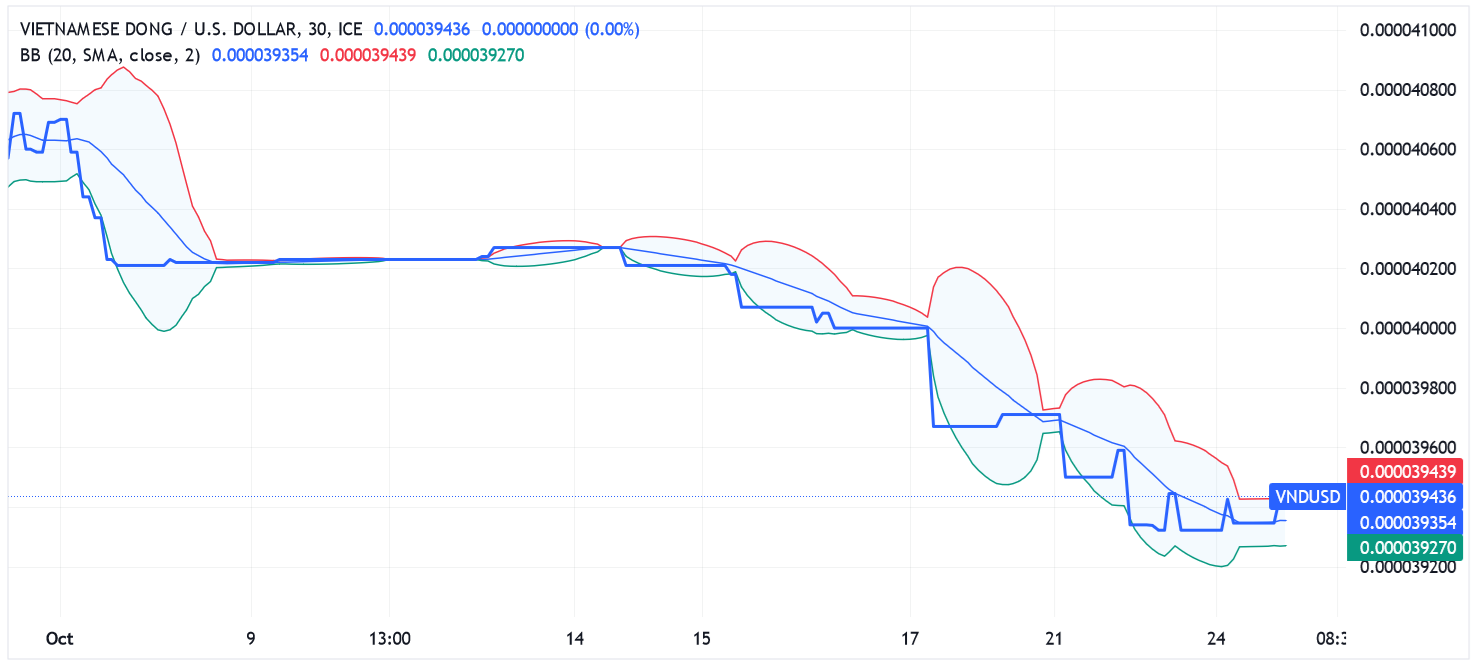Forex Trading In Vietnam



Decades of reform have transformed Vietnam into one of South-East Asia’s fastest-growing economies. With education and infrastructure also undergoing huge improvements, the country is now home to a rapidly expanding community of foreign exchange traders.
This guide will unpack everything you need to know to start forex trading in Vietnam. It’ll discuss popular currency pairings and the best time to trade them, explain the level of taxation that currency dealers can expect, and reveal the level of regulatory protection they enjoy.
It will also illustrate how a trade involving Vietnam’s official currency – the dong (VND) – and a major international currency might unfold.
Quick Introduction
- Vietnam’s traders can exchange the dong (VND) against various currencies, though low liquidity may present active traders with challenges looking for optimal prices and execution.
- They can also trade other minor and major currencies, and popular pairings like the EUR/USD and GBP/USD are dealt in huge volumes, making them suitable for day traders.
- Short-term forex traders generally pay personal income tax (PIT) on their profits at a rate of 5% to 35% to the General Department of Taxation.
- The State Bank of Vietnam (SBV) implements strict regulation of the country’s forex market, particularly those involving the VND. However, most traders recruit the services of an overseas broker.
Best Forex Brokers In Vietnam
Through our latest tests in April 2025, we've found these 4 platforms are the best for forex traders in Vietnam:
How Does Forex Trading Work?
Forex trading is the process of trading international currencies by financial institutions, companies, governments and individual traders.
It is the world’s biggest financial market, with an average daily turnover of $7.5 trillion, according to the latest statistics from the Bank for International Settlements (BIS).
Currencies are traded in pairs, such as the EUR/USD pairing, which pits the euro against the US dollar. The first pairing is known as the base currency, while the second is labelled the quote currency. It shows how much of the quote currency is needed to purchase one unit of the base currency.
Vietnam’s forex traders can trade the local currency against a range of major global currencies. These include the:
- VND/USD (versus the US dollar)
- VND/EUR (versus the euro)
- VND/AUD (versus the Australian dollar)
- VND/GBP (versus the British pound)
- VND/HKD (versus the Hong Kong dollar)
However, transaction volumes for non-major pairings like the VND tend to be extremely low, which in turn limits trading opportunities and makes dealing less cost-effective.
As a result, Vietnam’s short-term traders generally concentrate on heavyweight global pairings like the EUR/USD, GBP/USD and USD/CHF.
Vietnamese traders may be able to do business using the VND instead of popular international currencies (such as the US dollar or British pound). This can have numerous advantages, such as eliminating currency conversion charges and the problem of exchange rate movements.Here you can see a list of top brokerages offering dong-based accounts, as rated by DayTrading.com.
Is Forex Trading Legal In Vietnam?
Yes, although forex trading activity is subject to strict regulations.
Retail traders can only do business through licensed brokers, and individuals comply with a raft of rules laid down by the State Bank of Vietnam (SBV). Regulations are especially rigorous for trades involving the VND.
Dealing currencies is not common through domestic financial services providers. As a consequence, traders often use international trading platforms that are licensed by a respected overseas regulator (like the Australian Securities and Investments Commission (ASIC), or the UK’s Financial Conduct Authority (FCA)).
Is Forex Trading Taxed In Vietnam?
Yes. The General Department of Taxation (GDT) is responsible for administering the country’s tax system and collecting tax revenues.
Professional traders who are categorized as tax residents pay personal income tax (PIT) at the following rates:
| Annual taxable income (million VND) | Rate |
|---|---|
| 0 to 60 | 5% |
| 60 to 120 | 10% |
| 120 to 216 | 15% |
| 216 to 384 | 20% |
| 384 to 624 | 25% |
| 624 to 960 | 30% |
| More than 960 | 35% |
A tax resident is someone who meets one or all of the following criteria:
- Has lived in Vietnam for 183 days or more in either the calendar year, or a period of 12 consecutive months from their date of arrival;
- Has a property lease of 183 days or more;
- Holds a permanent or temporary residence card.
Non-residents pay PIT at a flat rate of 20%.
When Is The Best Time To Trade Forex?
The world’s currency markets are open 24 hours a day between Monday and Friday. But as with any region, trading forex in Vietnam can be a smoother and more profitable experience at particular times of the day.
This tends to be between the hours of 19:00 and 00:00 Indochina Time (ICT). ICT is the country’s official time zone, and is seven hours ahead of Greenwich Mean Time (GMT).
The start of this period coincides with the opening of financial markets in New York. It also takes in most of the afternoon session in London.
This is important because these venues are the first and second largest forex markets respectively. Those who do business at the same time as British and US traders enjoy superior liquidity and volatility, which in turn can provide better profit-making opportunities and the chance for day traders to limit trading costs (thanks to narrower bid and ask spreads).
A Forex Trade In Action
Let’s now consider what a forex trade might look like in Vietnam. In this hypothetical example, I’ll be trading the VND/USD pairing, which positions the official local currency against a major global counterpart.
The Background
My plan is to make a profit by buying the pairing and selling it shortly after the Federal Reserve makes its next interest rate announcement.
I’m convinced the central bank will cut interest rates by half a percentage point, to 4.5%. The broader market, meanwhile, has priced in a more modest 0.25% cut, based on analyst consensus.
If I’m right, the USD could lose ground against the VND. I come to this conclusion after studying economist reports, minutes from Federal Reserve meetings, comments in the media from central bank officials, and key economic data (like inflation gauges, job reports and growth numbers).
But before placing my trade, I need to decide on potential entry and exit positions. I do this by carrying out technical analysis, a process that sees me pore over price and trade volume charts to find patterns, trendlines and indicators.

The Trade
The Federal Reserve is set to make its interest rate statement at 01:00 ICT. So I sit down in front of my trading terminal 10 minutes beforehand to key in my trade. At this time, the VND/USD pairing is dealing at 0.000039331.
Short-term trading is fast-paced, so having strict risk management procedures in place are essential. For this trade, I decide to use both ‘take profit’ and ‘stop loss’ instructions to protect myself. The former closes my position automatically if the pair ascends to a level I’ve pre-selected, while the latter works by shutting my trade if the pairing declines to a pre-set level.
In this particular transaction:
- I place my ‘take profit’ instruction at 0.000039425.
- I input my ‘stop loss’ order at 0.000039287.
A few minutes after I’ve punched in my orders, the Fed announces a 0.5% cut in its benchmark rate, as I’d predicted. This causes the USD to fall against a range of other currencies, including the VND.
Within half an hour the VND/USD pairing has risen to trigger my ‘take profit’ instruction at 0.000039425. My trade is automatically closed, and I’ve made a gain of 9.4 pips.
Bottom Line
Vietnam’s interest in financial market trading is growing rapidly, although strict regulations by the SBV can make it difficult for forex traders. Dealers usually employ a foreign brokerage to place their trades, in part because local firms don’t offer access to the currency market.
Traders should ensure that the broker they select is authorized to operate, whether by Vietnam’s regulator or a respected body in another territory.
Forex trading is fast-paced and high-risk, so only deal with funds that you can afford to lose.
To begin, have a look at DayTrading.com’s list of top brokers for trading forex.
Recommended Reading
Article Sources
- The World Bank In Viet Nam – World Bank
- State Bank of Vietnam (SBV)
- Forex & Gold Management - SBV
- Vietnam - Individual - Taxes on personal income – PwC
- Vietnam - Individual - Tax administration - PwC
- Time Zone in Vietnam – Timeanddate.com
The writing and editorial team at DayTrading.com use credible sources to support their work. These include government agencies, white papers, research institutes, and engagement with industry professionals. Content is written free from bias and is fact-checked where appropriate. Learn more about why you can trust DayTrading.com



